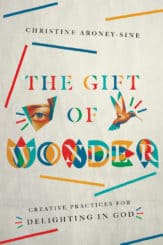God’s bequest of play buffers us from the spiritual burnout so rampant in our faith communities.

My Lenten theme this year is Breaking Down Walls. When I chose this theme I was not just thinking of the controversy about the wall on the U.S/Mexican border. All of us have walls in our lives, products of our own brokenness, and often too, of our responses to the brokenness of others. These walls separate us from the one true God, from each other and from God’s creation.
Before Lent began I created a succulent garden with walls partitioning off different sections of the garden. As part of my weekly observance, I broke down one of the walls, contemplating the new landscape I had created and the lessons the broken down walls taught me. It was both fun and inspirational.
Having fun is not what I usually think of when I plan my spiritual practices, and certainly not during Lent. Then one day Jesus’ words, Unless you become like a child you cannot enter the kingdom, riveted my attention. The great Swiss theologian Hans Urs Von Balthasar suggests that we need to take this literally. He believes that our alienation from God has buried in oblivion much of who God created us to be. He sees conversion as a rebirth into a truly childlike mentality in order to participate in God’s kingdom.
What childlike characteristics shape us into the people God intends us to be?
What childlike characteristics shape us into the people God intends us to be? I posted this question on Facebook and was amazed at the responses: curiosity, imagination, playfulness, awe and wonder, compassion, love of nature, trust and many more. I chose 12, did some research, and my new book The Gift of Wonder: Creative Practices for Delighting in God was the result. In the book, I encourage followers of Jesus to develop fresh approaches to spirituality that balance serious Biblical study and prayer with creative practices that engage all our senses and help us embrace the wonder and joy that God intends for us. Each chapter explores one childlike trait, ending with a creative spiritual exercise based on the characteristic discussed.
According to psychiatrist Stuart Brown, founder of the National Institute for Play, nothing lights up the brain like play. He believes play is as important as oxygen for our well-being. Play buffers us, as adults, against the burnout of the hustle and bustle of busyness. And from my perspective, anything that lights up the brain to that extent must be important to God.
Play may be God’s greatest gift to humanity.
Play may be God’s greatest gift to humanity. It’s how we form friendships, learn skills, and master difficult things that help us survive. It is a release valve for stress and an outlet for creativity. It helps us heal and opens us to wonder and awe. It brings us music, comedy, dance, and everything we value. Above all, play is how we bond with each other in nonthreatening, barrier-breaking ways. It’s how we communicate “I am safe to be around, I am not a threat.” When we play well together we replace negative beliefs and behaviors with positive thoughts and actions and heal emotional wounds. Play, I suspect, is meant to be an important part of our spiritual practices, too.
Embracing playfulness in our spiritual practices unveils glimpses into the heart of our fun-loving, playful God and into the joy-filled personalities God wants us to grow into. Play buffers us from the spiritual burnout so rampant in our faith communities. It liberates us to be ourselves and invites us to relax, take notice, and be unafraid to be vulnerable. I am convinced that play is an essential but often neglected element for the survival of a healthy relationship to God and to each other.
Here are a few suggestions from The Gift of Wonder you might like to try over the next few weeks that could help unleash your “inner child” and liberate your spirit.
Go on a play date. Have some fun. Visit your favorite museum or art gallery, get on a ferry, play with kids. Give up self-denial for Lent.
Create a doodle. This may not sound very spiritual, but it can become a powerful spiritual discipline. I think God loves to doodle. I only need to look down from a plane at the meandering pattern of a river to see that.
Before you doodle, ask yourself a question: “How could God use me as an instrument of reconciliation during Lent?” Prayerfully close your eyes. Doodle with your non-dominant hand for about 30 seconds, open your eyes and reflect on the image. Repeat the question. Ask God to speak to you. Color your image with pencils or crayons. Invite God to shape it into something meaningful. Pause after a minute of coloring and repeat your question. Write down what you sense God is saying. Keep the image on your desk or journal and continue to add to it over the week.
Practice Lectio Divina. This is a particularly fertile practice to stir imagination and creativity, especially when combined with creative and playful acts like drawing, writing or singing. Prayerfully recite a scripture verse several times, until a word resonates in your soul. Meditate on the word and allow God to take you deeper into its meaning. I like to paint my words on rocks and then decorate them and place them in my contemplative gardens for further revelation. It is great fun and incredibly inspirational. You may like to write your word in a journal, or craft it into a poem or song. Even a dance may stir within you. Feel free to express your word however God prompts.
Practice Visio Divina. This art of “divine seeing” is like Lectio Divina with images. You can use paintings or photos, but perhaps most fun and inspirational for this season is to practice Visio Divina as you walk. Pretend you are seeing everything for the first time. Be alert to the newness that Christ brings to each mundane object, moment or encounter. Notice streets signs, advertisements, graffiti on the walls, fallen leaves or sunshine through trees. Take a photo of what catches your attention. Perhaps it makes you laugh, or brings you to tears. Take your photo home and reflect on it. What is God saying to you about your neighborhood? Is there a new way God wants you to respond?
Find happiness in the small things. Children often notice little details. Adults, however, get caught up in our big and often overwhelming projects. By focusing on our own ideas of what should happen, we often put the Holy Spirit in a box and attempt to restrict what God is able to do. Our physical senses that make us aware of the fragrance of a rose or the sound of a bird singing can seem small and insignificant, but it is often through these that we are made aware of the intimate presence of God. Our senses make it possible for us to move beyond our disappointments and the sadness and pain of life.
I hope that you will allow God to liberate your creativity during Lent this year, and find the freedom of fresh expressions of faith and new depths of spirituality.
 Christine Aroney-Sine facilitates the popular contemplative blog Godspace. In her new book The Gift of Wonder: Creative Practices for Delighting in God (InterVarsity Press, March 2019) she explores characteristics like play, curiosity and imagination that shape us into the people God intends us to be.
Christine Aroney-Sine facilitates the popular contemplative blog Godspace. In her new book The Gift of Wonder: Creative Practices for Delighting in God (InterVarsity Press, March 2019) she explores characteristics like play, curiosity and imagination that shape us into the people God intends us to be.


